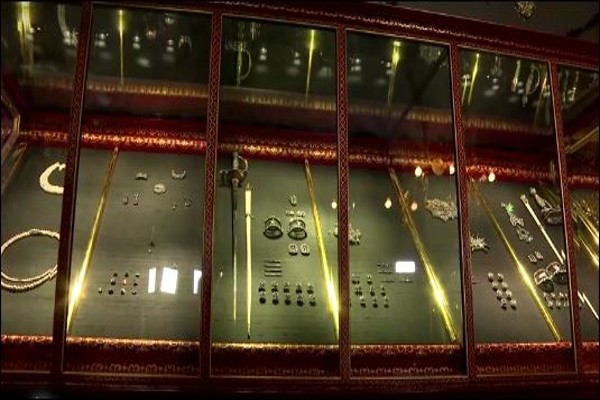DRESDEN, GERMANY: Nearly five years after millions of euros’ worth of jewellery was stolen in a museum heist in eastern Germany, visitors can once again admire nearly all of the precious pieces in person.
In November 2019, thieves stole pieces that contained more than 4,300 diamonds with an estimated value of over 113 million euros ($124 million), from the Gruenes Gewoelbe (Green Vault) museum in Dresden, in the eastern German state of Saxony.
Police have said most of the jewels stolen from the museum, which houses one of Europe’s greatest art collections, have been recovered. Pieces still missing include an epaulette on which a precious stone known as the Dresden White Diamond was mounted.
Starting this week, the jewellery pieces will be back on display in their original spots – albeit in the same condition in which they were recovered in December 2022 as they are part
of ongoing legal proceedings and still considered court property.
“There are certain things that perhaps absolute experts can see; we with the naked eye can actually barely see the damage,” said Marion Ackermann, Dresden State Museums director general.
“And this damage is mainly due to the fact that they were either broken out during the crime … or improperly stored by the perpetrators after the crime,” Ackermann added.
Five men, all members of the same family, were sentenced to several years behind bars in May 2023 for their involvement.
The heist was a bitter lesson about security at the museum, which before had been considered one of the safest buildings in Europe, said Saxony premier Michael Kretschmer.
“We were shocked that it was actually possible, but we have drawn the necessary conclusions,” he said on Tuesday.
The stolen Dresden collection was assembled in the 18th century by Augustus the Strong, Elector of Saxony and later King of Poland, who commissioned ever more brilliant jewellery as part of his rivalry with France’s King Louis XIV.
The treasures survived Allied bombing raids in World War Two, only to be carted off as war booty by the Soviet Union.
They were returned to Dresden, the historic capital of the state of Saxony, in 1958.
(REUTERS)
In a career spanning three decades and counting, Ramananda (Ram to his friends) has been the foreign editor of The Telegraph, Outlook Magazine and the New Indian Express. He helped set up rediff.com’s editorial operations in San Jose and New York, helmed sify.com, and was the founder editor of India.com.
His work has featured in national and international publications like the Al Jazeera Centre for Studies, Global Times and Ashahi Shimbun. But his one constant over all these years, he says, has been the attempt to understand rising India’s place in the world.
He can rustle up a mean salad, his oil-less pepper chicken is to die for, and all it takes is some beer and rhythm and blues to rock his soul.
Talk to him about foreign and strategic affairs, media, South Asia, China, and of course India.





